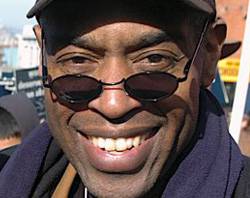The liberal Ninth Circuit Court of Appeals issued a unanimous 3-0 decision late yesterday in a case involving pro-life pastor Walter Hoye and Oakland’s denial of his free speech rights in the context of abortion.
Hoye, a pastor who has highlighted the problem of high abortion rates in the African-American community, saw his rights to provide abortion alternatives information to women outside local abortion facilities denied when Oakland city officials passed the buffer law preventing him, or any pro-life advocate, from coming within 8 feet of the abortion center or women heading to it.
 In issuing the opinion in Hoye v. Oakland, the appeals court agreed with the Life Legal Defense Foundation, a pro-life law firm representing Hoye, in seeing the ordinance as an unconstitutional infringement of free speech. “We agree with Hoye that there are grave constitutional problems with the manner in which the City has understood and enforced its Ordinance,” the court, led by Circuit Judge Marsha S. Berzon, wrote.
In issuing the opinion in Hoye v. Oakland, the appeals court agreed with the Life Legal Defense Foundation, a pro-life law firm representing Hoye, in seeing the ordinance as an unconstitutional infringement of free speech. “We agree with Hoye that there are grave constitutional problems with the manner in which the City has understood and enforced its Ordinance,” the court, led by Circuit Judge Marsha S. Berzon, wrote.
The court reversed the district court’s determination that the ordinance is valid as the city applies it, because the City discriminates in enforcing the ordinance against Hoye but not other speakers. The City only prosecutes persons for “approaching” women within the “bubble zone” if they are trying to persuade the woman not to have the abortion while abortion center staffers and others “facilitating” abortions can approach and give the women whatever message they want — often urging women to ignore Hoye.
Although Hoye scrupulously followed the law, he has suffered arrest, prosecution and imprisonment due to Oakland’s determination to shut out his message, while abortion facility staff have never been prosecuted. However, the appeals court concluded, “Oakland’s enforcement policy is a constitutionally invalid, content-based regulation of speech.”
LLDF Legal Director Katie Short told LifeNews.com the decision is also a victory for pro-life advocates because it limits the effect of a ruling in a case in Colorado, the Hill decision, that also limited the free speech rights of pro-life advocates. While the opinion also stated “we do not find any relevant differences between the Ordinance’s purpose and text and those of the Colorado statute that the Supreme Court held to be constitutional in Hill,” the Court noted that the reasoning of the Hill decision “has been criticized by scholars of various stripes.”
“This part of the decision points to a possible narrowing of the Supreme Court’s awful decision in Hill,” Short said. “In evaluating a constitutional challenge to a bubble law like this, courts will not turn a blind eye to the challenges facing pro-lifers in communicating their message, including when those challenges come from the bad behavior of clinic escorts.”
In August 2009, federal district court judge Charles Breyer ruled the law constitutional and set the stage for an appeal and a battle at the Ninth Circuit Appeals Court. In a 25-page memorandum opinion, Breyer held that the ordinance, which applies only outside abortion businesses, was not content- or viewpoint-based on its face. Breyer also ruled that the law is narrowly tailored, even though it prohibits someone giving a brochure on abortion alternatives to a woman entering an abortion center.
But, during the hearing before the appeals court, lawyers for Oakland encountered tough questioning from Ninth Circuit justices Marsha Berzon and Stephen Reinhardt during oral argument on Pastor Walter Hoye’s challenge to the constitutionality of the measure.
The city’s admission that it interpreted the law as not applying to abortion center escorts “facilitating access” to abortion clinics met with raised eyebrows. But its suggestion that the law didn’t apply to anything but speech intended to discourage women from having abortions brought sharp rebukes from the justices.
Short and volunteer attorney Michael Millen filed suit on Pastor Hoye’s behalf immediately after the law’s passage in December 2007.
“Katie Short did a great job of presenting our case,” said Millen, “but it was the City’s own admission of its true intentions that should make the justices’ jobs very easy. Under the guise of ‘facilitating access’, the City gave carte blanche to any speech that encourages women to go into clinics, while punishing speech that merely suggested alternatives to abortion.”
Oakland officials went so far as to say that even leaflets that were distributed outside the abortion facility would need to be reviewed by police to determine if they violate the law.
“You just won’t find a clearer textbook example of forbidden content-based discrimination than that,” added Millen.
The lawsuit challenged several aspects of the ordinance as unconstitutional, including its preference for pro-abortion speech over pro-life speech. The suit also alleged that the active interference and blocking by abortion clinic escorts turned the law’s 8-foot “buffer” around patients into an insurmountable barrier to communication.







